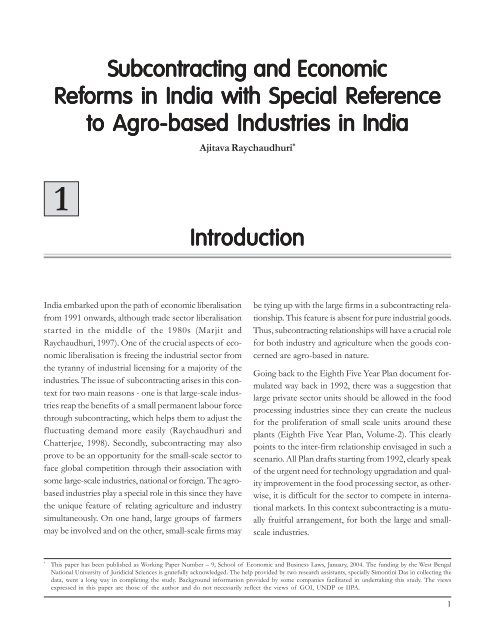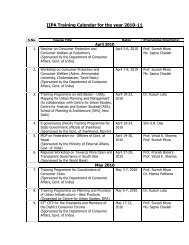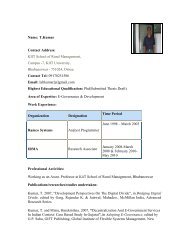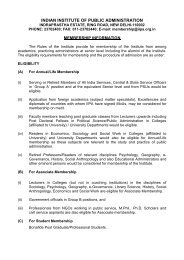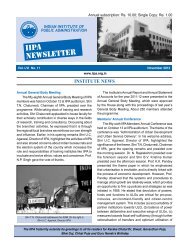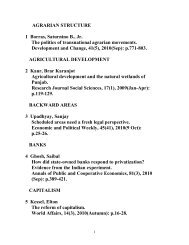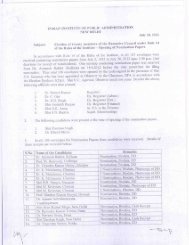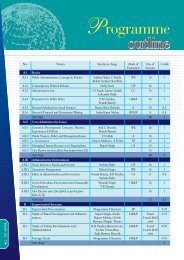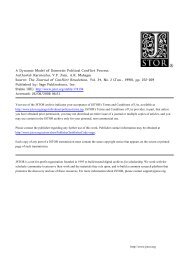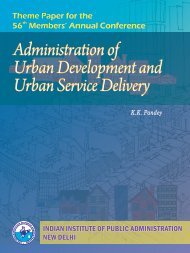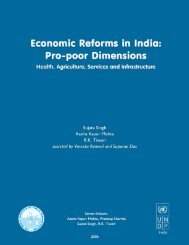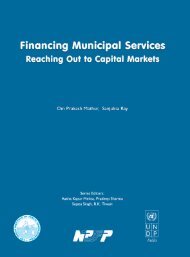Subcontracting and Economic - Indian Institute of Public Administration
Subcontracting and Economic - Indian Institute of Public Administration
Subcontracting and Economic - Indian Institute of Public Administration
Create successful ePaper yourself
Turn your PDF publications into a flip-book with our unique Google optimized e-Paper software.
<strong>Subcontracting</strong> <strong>and</strong> <strong>Economic</strong><br />
Reforms in n India with ith Special Reference<br />
to Agro-based Industries in India<br />
Ajitava Raychaudhuri *<br />
1<br />
Introduction<br />
India embarked upon the path <strong>of</strong> economic liberalisation<br />
from 1991 onwards, although trade sector liberalisation<br />
started in the middle <strong>of</strong> the 1980s (Marjit <strong>and</strong><br />
Raychaudhuri, 1997). One <strong>of</strong> the crucial aspects <strong>of</strong> economic<br />
liberalisation is freeing the industrial sector from<br />
the tyranny <strong>of</strong> industrial licensing for a majority <strong>of</strong> the<br />
industries. The issue <strong>of</strong> subcontracting arises in this context<br />
for two main reasons - one is that large-scale industries<br />
reap the benefits <strong>of</strong> a small permanent labour force<br />
through subcontracting, which helps them to adjust the<br />
fluctuating dem<strong>and</strong> more easily (Raychaudhuri <strong>and</strong><br />
Chatterjee, 1998). Secondly, subcontracting may also<br />
prove to be an opportunity for the small-scale sector to<br />
face global competition through their association with<br />
some large-scale industries, national or foreign. The agrobased<br />
industries play a special role in this since they have<br />
the unique feature <strong>of</strong> relating agriculture <strong>and</strong> industry<br />
simultaneously. On one h<strong>and</strong>, large groups <strong>of</strong> farmers<br />
may be involved <strong>and</strong> on the other, small-scale firms may<br />
be tying up with the large firms in a subcontracting relationship.<br />
This feature is absent for pure industrial goods.<br />
Thus, subcontracting relationships will have a crucial role<br />
for both industry <strong>and</strong> agriculture when the goods concerned<br />
are agro-based in nature.<br />
Going back to the Eighth Five Year Plan document formulated<br />
way back in 1992, there was a suggestion that<br />
large private sector units should be allowed in the food<br />
processing industries since they can create the nucleus<br />
for the proliferation <strong>of</strong> small scale units around these<br />
plants (Eighth Five Year Plan, Volume-2). This clearly<br />
points to the inter-firm relationship envisaged in such a<br />
scenario. All Plan drafts starting from 1992, clearly speak<br />
<strong>of</strong> the urgent need for technology upgradation <strong>and</strong> quality<br />
improvement in the food processing sector, as otherwise,<br />
it is difficult for the sector to compete in international<br />
markets. In this context subcontracting is a mutually<br />
fruitful arrangement, for both the large <strong>and</strong> smallscale<br />
industries.<br />
*<br />
This paper has been published as Working Paper Number – 9, School <strong>of</strong> <strong>Economic</strong> <strong>and</strong> Business Laws, January, 2004. The funding by the West Bengal<br />
National University <strong>of</strong> Juridicial Sciences is gratefully acknowledged. The help provided by two research assistants, specially Simontini Das in collecting the<br />
data, went a long way in completing the study. Background information provided by some companies facilitated in undertaking this study. The views<br />
expressed in this paper are those <strong>of</strong> the author <strong>and</strong> do not necessarily reflect the views <strong>of</strong> GOI, UNDP or IIPA.<br />
1


